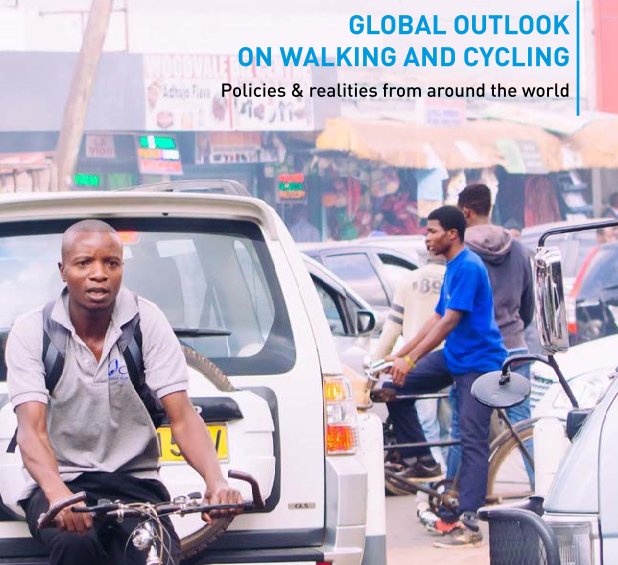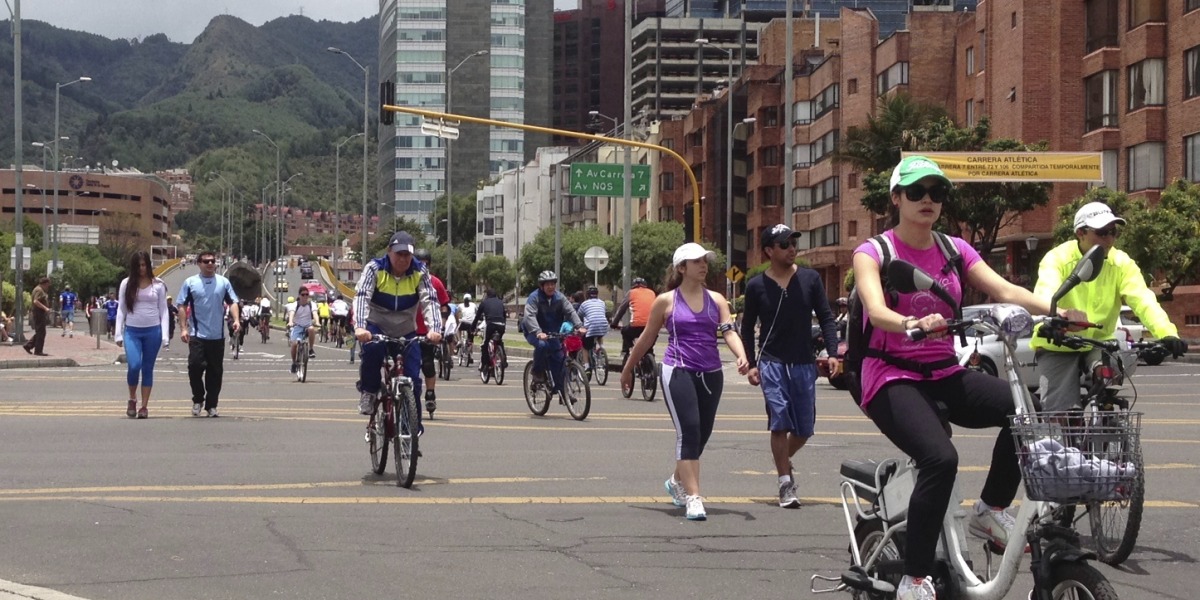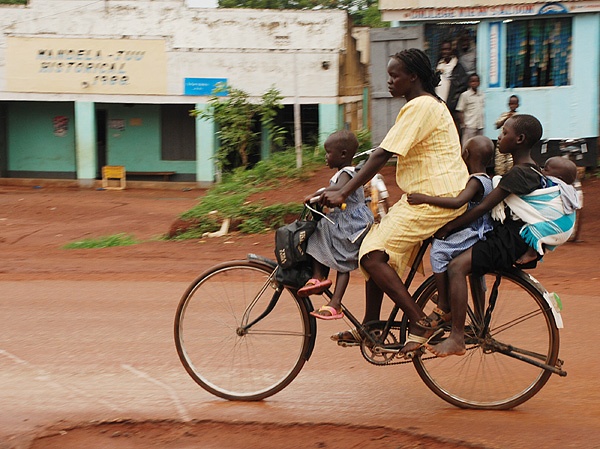
UNEP published Global Outlook on Walking and Cycling
A detailed report on non-motorized transport (NMT) which includes walking and cycling was released in September 2016 by UNEP (United Nations Environment Programme). In its foreword, the UNEP Executive Director Erik Soldheim calls for “mobility of people instead of mobility of cars”. Actually, one fourth of today’s world CO2 emissions is caused by motorized transportation and such air pollution is harmful to human health. Millions of people all around the world daily rely on walking and cycling since it is cheap and it brings important social, economic and environmental benefits. Nevertheless, it is assumed that one person dies every 30 seconds in road accidents and pedestrians represent more than 25% of the fatalities. The road safety is thus a major global issue which should become the focal point of transport policies.
 This report is labeled as global but in fact it studies only 28 developing countries in Africa, Asia and Latin America which participated in a complex survey. In all these countries, the majority of inhabitants rely on NMT except of Singapore. Some interesting numbers have been revealed: In Chinese cities the cycling modal share is up to 60% while in African cities it is only up to 5%. Furthermore, in Malawi, a developing country in Eastern Africa, 80-90% of people moving on rural roads are cyclists, but there is a high level of fatalities and most of them are men, because women, children and elderly are a vulnerable group with low mobility. On the other hand, some Latin American countries recorded a large progress in promoting sustainable transport. In Bogota, cycling has reached 5% of the total transport mode share thanks to the investments in bike sharing system as well as new cycle paths, and local authorities aim to double it by 2019. The Colombian capital already has the most extensive network of cycleways in the region, the world’s longest pedestrian corridor as well as the biggest Car Free Day where 120 km of main roads are closed for cars every Sunday for seven hours: a “ciclovia” (cycling way) for cyclists, runners, skaters and pedestrians is thus open.
This report is labeled as global but in fact it studies only 28 developing countries in Africa, Asia and Latin America which participated in a complex survey. In all these countries, the majority of inhabitants rely on NMT except of Singapore. Some interesting numbers have been revealed: In Chinese cities the cycling modal share is up to 60% while in African cities it is only up to 5%. Furthermore, in Malawi, a developing country in Eastern Africa, 80-90% of people moving on rural roads are cyclists, but there is a high level of fatalities and most of them are men, because women, children and elderly are a vulnerable group with low mobility. On the other hand, some Latin American countries recorded a large progress in promoting sustainable transport. In Bogota, cycling has reached 5% of the total transport mode share thanks to the investments in bike sharing system as well as new cycle paths, and local authorities aim to double it by 2019. The Colombian capital already has the most extensive network of cycleways in the region, the world’s longest pedestrian corridor as well as the biggest Car Free Day where 120 km of main roads are closed for cars every Sunday for seven hours: a “ciclovia” (cycling way) for cyclists, runners, skaters and pedestrians is thus open.
 Especially in Africa, cycling has a bad image since using cars has been always associated with a high social status and education as a colonization legacy, the report finds. Therefore, cycling is regarded as a transport mode for the poor. Having a car has always been a goal for all but the African cities built without an elaborated long-term urban plan cannot handle such an increased traffic which causes transport collapses. Similarly, India with a historically high percentage of cyclists currently faces an emerging automobile culture when cars have become affordable for a wider range of society. That is why promoting cycling has never been more present. Consequently, national and local authorities should invest in soft mobility rather than in new motorways and change people’s view on cycling. For instance, in Kenya, several schools are too far for children to walk there every day considering that they have to help their parents after school hours, so the absence rate is high. After bicycles were distributed to students as a policy measure, they do not lose so much time by walking and the absence rate in schools significantly dropped. There is also a huge economic benefit because new bicycles create jobs for newly trained mechanics.
Especially in Africa, cycling has a bad image since using cars has been always associated with a high social status and education as a colonization legacy, the report finds. Therefore, cycling is regarded as a transport mode for the poor. Having a car has always been a goal for all but the African cities built without an elaborated long-term urban plan cannot handle such an increased traffic which causes transport collapses. Similarly, India with a historically high percentage of cyclists currently faces an emerging automobile culture when cars have become affordable for a wider range of society. That is why promoting cycling has never been more present. Consequently, national and local authorities should invest in soft mobility rather than in new motorways and change people’s view on cycling. For instance, in Kenya, several schools are too far for children to walk there every day considering that they have to help their parents after school hours, so the absence rate is high. After bicycles were distributed to students as a policy measure, they do not lose so much time by walking and the absence rate in schools significantly dropped. There is also a huge economic benefit because new bicycles create jobs for newly trained mechanics.
The report also puts forward an NMT index comparing countries in terms of the level of policy commitment and safety of NMT users. Denmark was included in the comparison as a pioneer of soft mobility and it scored by far the best. South Africa has a relatively strong national NMT policy but safety was ranked very low while for Hungary or Portugal it is the other way around. In the end, the report proposes five recommendations for policy makers on national and local levels to promote NMT:
- Introduce a NMT policy or revise the current one
- At least 20% of the whole transport budget dedicated to NMT
- Set modifiable and measurable goals and monitor them
- Include a diverse range of stakeholders and ask users
- Necessity of political will and active support of soft mobility
ECF welcomes the UNEP key policy recommendations that in our view should not be applied in low or middle income countries only but in the developed world too.
"Global Outlook on Walking and Cycling" (UNEP, 2016): http://www.unep.org/transport/sharetheroad/PDF/globalOutlookOnWalkingAndCycling.pdf
Contact the author
Recent news!
Upcoming events
Contact Us
Avenue des Arts, 7-8
Postal address: Rue de la Charité, 22
1210 Brussels, Belgium









